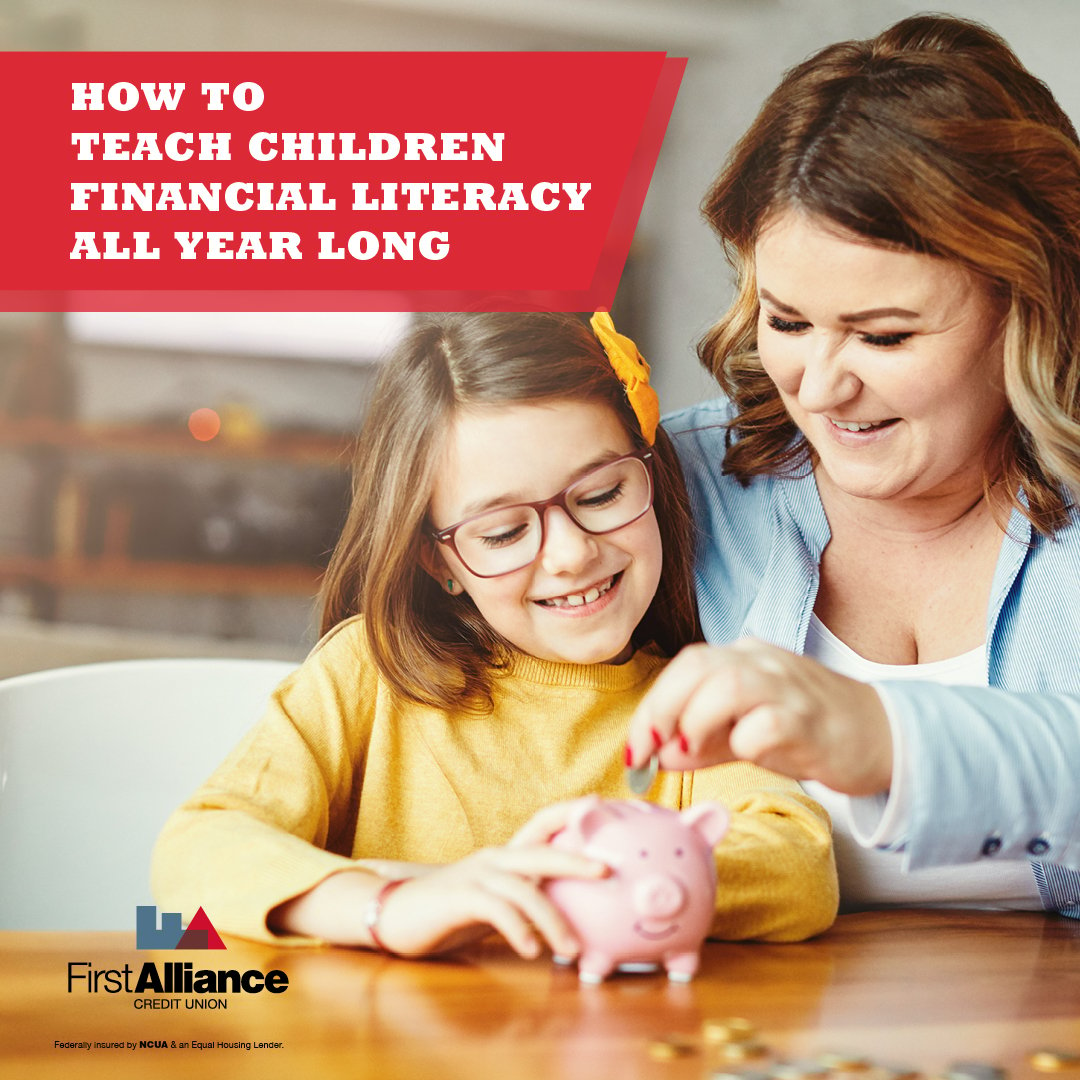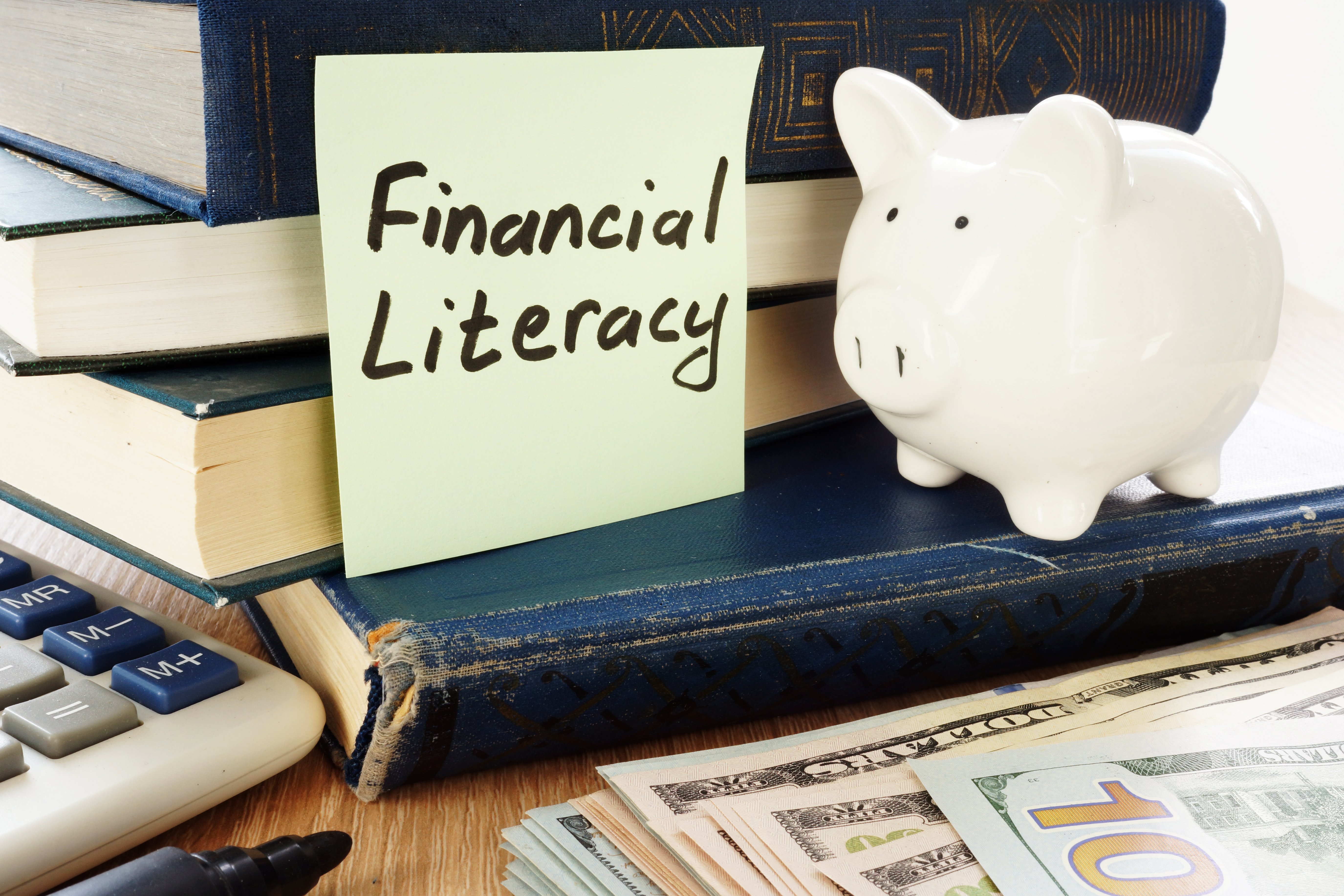How to Teach Children Financial Literacy all Year Long
April is Youth Financial Literacy month, and as part of this several credit unions, including First Alliance, are putting on programs to help...
8 min read
 Chris Gottschalk
:
Dec 26, 2023 4:45:00 AM
Chris Gottschalk
:
Dec 26, 2023 4:45:00 AM

Did you know that, according to one report, almost half of Americans make a New Year’s Resolution related to finance? If you’re one of those people, it’s a safe bet that your resolution involves one of the following topics:
What’s interesting is all of these resolutions deal with some basic financial literacy issues. In other words, the more financially literate you are, the more likely you are to keep your resolution. That’s important, because according to that same report, over a quarter of Americans feel that financial resolutions are the hardest ones to keep.
Fortunately, getting financially literate isn’t hard. All you need to do is follow five steps.
Before we talk about what steps you can take to get financially literate, it might help to know what financial literacy is. Simply put, financial literacy is having the financial knowledge and skills to effectively manage your money, from budgeting to investing.
Unfortunately, no. According to the website CivicScience, 60% of people say they’re only somewhat financially literate, and 10% of people don’t think they are financially literate at all. That leaves only 30% of people who feel they’re financially literate.
Having good financial literacy skills provides numerous benefits. It helps individuals make informed financial decisions, manage their money effectively, avoid debt, and plan for the future. It also increases financial independence, reduces stress, and improves overall financial well-being.
This might be the most important part of financial literacy. When you have your money under control, you know where it’s going each month.
More importantly, you’ll get the peace of mind knowing that you have your necessary expenses covered. When you do decide to spend money on something like a movie or a cup of coffee, you’ll know you aren’t using money that should be going to your electric bill or rent.
The best way to get your money under control is to come up with a plan for how you’ll spend your money each month. In order to do this, list your expenses, prioritizing all your necessary expenses like rent or mortgage, food and gasoline, as well as monthly bills for utilities. When you have all your expenses listed, make sure they’re not more than your total income each month.
Alert readers might realize that this is the same way you create a monthly budget, and you’d be right—a spending plan is another name for a budget. No matter what you call it, though, it’s the single best way to get your money under control.
When you create a budget, you’ll know where your money is going each month. You can rest assured that all your monthly expenses are taken care of, and you’ll know how much money you have left over for your discretionary expenses.
Once you have control over your money, you can start working on the next step—saving regularly. This is a big step toward becoming financially secure.
When you have money saved up, like in an emergency fund, you don’t have to worry about what will happen if you get into a car accident or lose your job. You’ll also be able to protect your assets, so if you do encounter financial difficulty you won’t have to dip into your retirement or sell your car or, worse yet, your house.
It’s also worth pointing out that when you put your money in a savings account, including a money market account or a certificate of deposit, your money earns interest. As time goes on, that interest will earn interest of its own, also known as compound interest. The earlier you start saving, the more time your money has to grow and earn even more money.
The best way to start saving regularly is to put aside a small percent of your paycheck each month. Most financial experts recommend starting at 10%, but if money is tight, just try to set aside whatever you can comfortably afford.
No matter where you start, though, you should make a goal to try to increase your savings a little bit each year. If you start putting aside 10% of your paycheck this year, next year try to increase that amount to 11% or 12%. Remember, though, only save as much as you can comfortably afford.
It’s worth pointing out that if you get your paycheck deposited directly to your account, you can use Direct Deposit to split up your paycheck automatically. You can usually do that either by deciding the percentage of your paycheck you’d like put in a savings account or by dollar amount.

Getting out of debt might seem more like a goal than a step, but the truth is that leaning how to manage debt is a crucial part of financial literacy.
Debt locks up money you could be putting toward other items in your budget, including financial goals you might have to delay while you’re paying off your bill. You also get charged on the money you owe, so the longer you take to pay off debt, the more you’ll owe. This can be especially problematic with high-interest debt, like credit card debt.
The first step in any debt paying strategy is to keep making all your credit card and loan payments. Then, you’ll want to take any extra money you have in your budget and use it to pay off on one debt at a time. The strategy you select will determine which debt you pay off first.
When you use the snowball method of paying off debt, you focus on paying off the smallest debt you have. Once you’ve paid it off, pay off the next smallest debt you have and so on until you’ve paid off all your debts.
You might not be surprised to learn that if you use the reverse snowball method to repay your debt, you’ll instead pay off your largest debt first instead of the smallest. This method takes a little longer to see progress on paying off your debt, but once you pay off that first debt, paying off the smaller debts will be a lot easier.
Finally, there’s the avalanche method, where you pay off the debt with the highest interest rate first. This may save you money in the long run by wiping out the debt that will cost you the most interest first.
Of course, there is another way to pay off your debts that might just save you time and money. When you take out a debt consolidation loan, you’re reducing the number of payments you make each year down to one. Even better, you may save money if the debt consolidation loan you get has a lower interest rate than even one of your debts, especially credit cards.
Your credit score plays a significant role in your financial life. Understanding your credit score, maintaining a good credit rating, and improving your credit score are essential steps in financial literacy.
Your credit score is important for the following reasons:
A good credit score can lead to lower interest rates on loans, saving money over the loan term. Lenders use credit scores to assess the risk of lending, and a good credit score indicates your creditworthiness, resulting in better loan terms.
Landlords, employers, and insurance companies may also consider credit scores in their decisions. A good credit score can improve your chances of getting approved for an apartment, job, or favorable insurance rates.
Credit scores reflect your financial responsibility and trustworthiness to potential creditors. By maintaining a good credit score, you show that you are responsible with your credit, making you a more attractive borrower.
A good credit score can provide access to better financial products and favorable terms, such as credit cards, loans, and interest rates.
Viewing your credit score isn't hard. If you're a First Alliance Credit Union member, for instance, you can check your credit score simply by logging into your online bank account or opening our mobile app. Even if you're not a First Alliance member, though, you can check your credit score by going to sites like Credit Karma. You can even contact the three credit union bureaus--Experian, Equifax and TransUnion--directly to get your credit report from each of them for free once per year.
Credit scores typically range from 300 to 850, depending on the scoring model used. A good credit score, generally, falls within the range of 670 to 850, but different lenders and financial institutions may have different criteria for defining a good credit score. Here's a general guide:
Credit scores above 700 are generally considered good, indicating creditworthiness and the ability to manage credit responsibly.
It's important to keep in mind that credit score ranges can vary, so it's crucial to check the credit score range used by the specific lender or financial institution you're working with.
Maintaining a good credit score involves responsible credit management, timely payment of bills, keeping credit card balances low, and avoiding excessive credit inquiries.
Improving your credit score is possible with the following steps:
Regularly check your credit report for errors or discrepancies. If you find any errors, report them to the credit bureaus and have them corrected. You can get a free copy of your credit report every year at the website annualcreditreport.com
Pay your bills on time to avoid negatively impacting your credit score. Late payments can have a significant impact on your credit rating.
Keep your credit card balances low. High credit card balances can negatively affect your credit score, so it's important to pay off your credit card debt and keep your credit utilization ratio low.
Avoid opening multiple credit accounts in a short period of time, as this can lower your credit score. Only apply for credit when you need it, and be mindful of the number of credit inquiries.
Limit credit inquiries, as they can affect your credit score. Be cautious of the number of times your credit report is pulled, especially when applying for loans or credit cards.
Setting financial goals is the final step towards financial literacy. By setting goals, you give yourself a clear direction, motivation, and a roadmap to financial success. Here are some questions to ask when setting your financial goals:
When setting your financial goals, consider the following questions:
What are your short-term and long-term financial goals? Identify the specific goals you want to achieve, such as buying a home, starting a business, saving for retirement, or funding your children's education.
How will achieving these financial goals impact your financial situation? Consider the financial benefits, security, and personal fulfillment that achieving these goals will bring.
Are your financial goals realistic and achievable within your current financial situation? Evaluate your income, expenses, debt, and savings to determine if your goals are attainable. If not, consider adjusting your goals or creating a step-by-step plan to reach them.
What resources or information do you need to attain your financial goals? Identify the knowledge, skills, or financial education that you need to achieve your goals. Seek out resources, courses, or professional assistance if necessary.
What steps can you take to stay motivated and committed to your financial goals? Find ways to stay motivated, such as visualizing your goals, tracking your progress, celebrating milestones, and surrounding yourself with support from friends or family.
When setting your financial goals, it's important to make them SMART:
Specific: Clearly define your financial goals, including the amount of money, the timeframe, and the purpose of the goals.
Measurable: Set quantifiable targets, such as the amount of money you want to save, the number of debt payments you want to make, or the percentage of your income you want to allocate towards investments.
Attainable: Ensure your financial goals are realistic, considering your current financial situation, income, expenses, debt, and savings. Setting goals that are within your reach increases the likelihood of achieving them.
Realistic: Align your financial goals with your personal values, long-term objectives, and financial situation. Your goals should be meaningful and relevant to your life.
Time-bound: Set a specific timeline for achieving your financial goals. This adds a sense of urgency, helps you stay focused, and provides a clear deadline for your goals.
It's hard to overstate the benefits of financial literacy. The more you know about money management and saving, the more financially secure you'll be.
Even better, concepts like budgeting, saving and setting goals aren't hard to learn. You can immediately start using them to build a strong financial foundation, make informed decisions and achieve the goals you set for yourself. You can even pass these lessons onto your children to teach them about financial wellness and set them up for success early in life.
Want to make financial literacy even easier? First Alliance Credit Union has a LOT of free downloadable resources on their Resource page that can help you master those essential financial literacy skills. These include:
There's even a financial fitness quiz you can take to get a sense of where you are financially and the best financial literacy steps you can take to improve your fitness.

April is Youth Financial Literacy month, and as part of this several credit unions, including First Alliance, are putting on programs to help...

What is financial literacy and why is it important? Financial literacy is the ability to understand the important financial topics related to...

When you teach your kids financial literacy—the knowledge and skills you need to make effective, informed decisions about money management—you're...